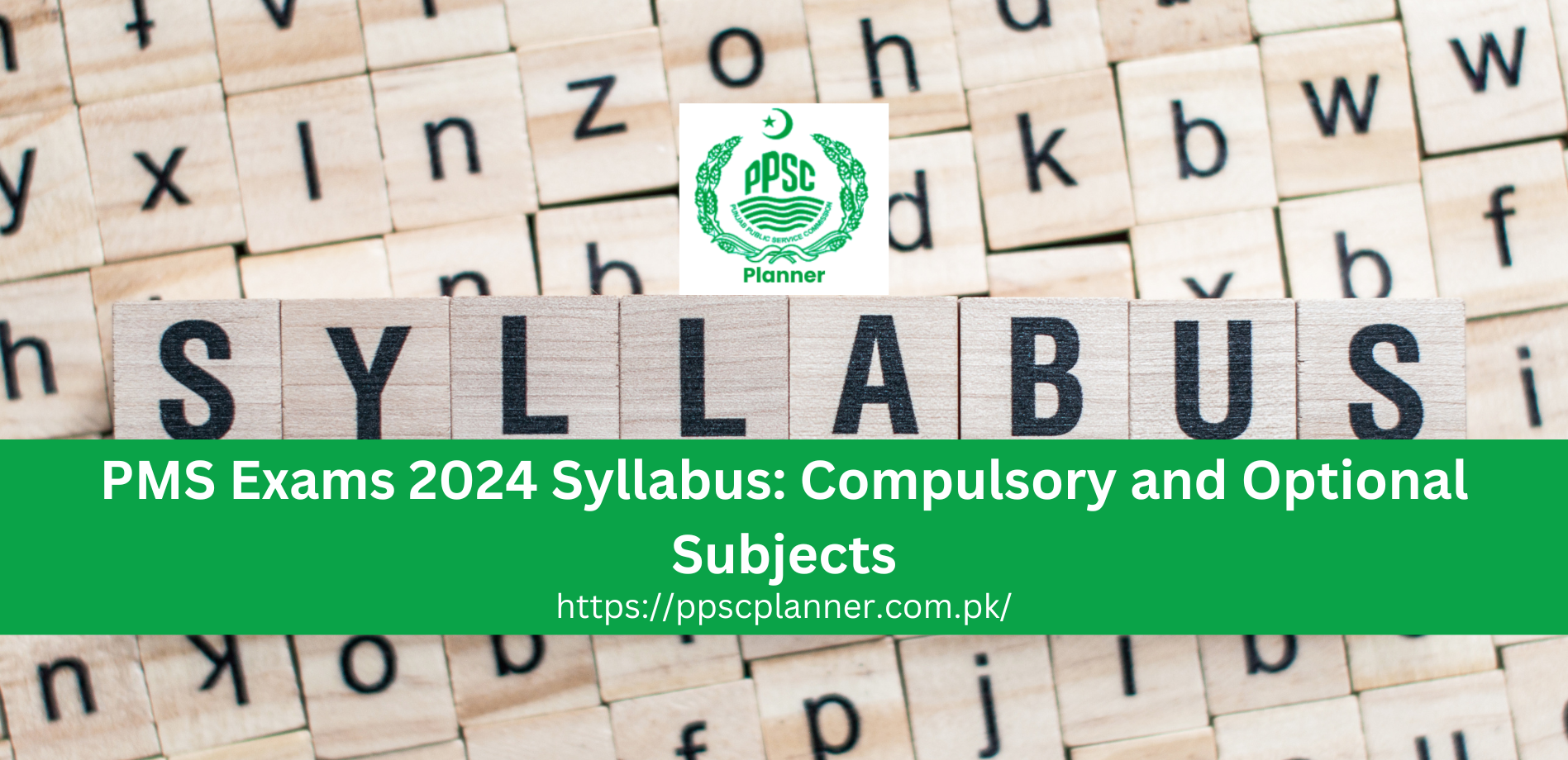PMS Exams 2024 Syllabus: The Punjab Public Service Commission (PPSC) conducts the Combined Competitive Examination for the Provincial Management Service (PMS) in Pakistan. This prestigious examination evaluates candidates’ proficiency in various subjects essential for administrative roles. Understanding the outlines of both compulsory and optional subjects is crucial for aspirants aiming to excel in the PMS exams.
Keep visiting PPSC Planner for latest updates and guides of PPSC Jobs.
PMS Exams 2024 Syllabus
| 1 | Syllabus | PMS Compulsory Papers | Download |
| 2 | Syllabus | PMS Optional Papers | Download |
| 3 | Optional Subjects Groups | PMS Optional Subjects Groups | Download |
Compulsory Subjects Overview
English Essay (100 Marks)
In the English Essay paper, candidates must showcase their ability to articulate their thoughts effectively in English. With a word limit of approximately 1500 words, candidates are presented with a diverse range of topics covering areas such as education, economy, foreign policy, governance, human rights, constitution, law & order, and socio-economic issues pertinent to Pakistan. The evaluation criteria include conceptual clarity, logical reasoning, and the correct application of the English language.
English (Precis, Comprehension & Translation) (100 Marks)
This paper assesses candidates’ proficiency in precis writing, comprehension, syntax, translation, grammar, and vocabulary in English. The examination comprises several components:
- Precis Writing: Candidates are required to compress a passage while maintaining its essence and suggesting a suitable topic.
- Comprehension: Candidates must answer questions based on a provided passage, demonstrating their understanding of the text.
- Grammar & Vocabulary: Questions pertaining to the correct usage of grammar rules, vocabulary, and sentence structure are included.
- Sentence Correction: Candidates are tasked with identifying and rectifying grammatical errors in provided sentences.
- Grouping of Words & Pair of Words: Candidates categorize words based on similarity or opposition in meaning and utilize idioms, proverbs, antonyms, and synonyms effectively.
Urdu (Essay, Precis, Comprehension & Translation) (100 Marks)
Similar to the English Essay paper, the Urdu Essay paper requires candidates to articulate their ideas coherently in Urdu, covering a wide array of topics relevant to Pakistan. The evaluation criteria include clarity of thought, logical reasoning, and proficiency in the Urdu language. Additionally, candidates must demonstrate their ability in precis writing, comprehension, grammar, vocabulary, and translation from English to Urdu and vice versa.
Islamic Studies/Ethics (100 Marks)
This paper is divided into sections for Muslim and non-Muslim candidates, focusing on different aspects:
- Islamic Studies: Covers topics such as the introduction to Islam, the life of Prophet Muhammad (PBUH), early Islamic history, human rights in Islam, Islam’s impact on the world, Islamic code of life, and ethics.
- Ethics for Non-Muslims: Encompasses the study of various religions, their contributions to society, ethical principles, human rights, commonalities among religions, and the concept of revelation.
Pakistan Studies (100 Marks)
The Pakistan Studies paper examines candidates’ knowledge of Pakistan’s history, geography, society, culture, economy, regional dynamics, national security challenges, international relations, constitutional history, political evolution, foreign policy, and socio-economic issues. It also includes topics such as the Kashmir dispute, Afghanistan’s impact on Pakistan, energy problems, governance issues, and the role of Pakistan in global affairs.
General Knowledge (Objective) (100 Marks)
This objective paper evaluates candidates’ awareness of current affairs, historical events, socio-economic and political issues, regional and global relations, scientific knowledge, environmental studies, food sciences, computer science, mathematics, and general facts. Candidates are expected to demonstrate updated knowledge and understanding across a broad spectrum of subjects.
Optional Subjects Groups Overview
The PMS exam offers a variety of optional subjects grouped into several categories, allowing candidates to choose three subjects from different groups. Each optional subject carries 200 marks, contributing to a total of 600 marks for the optional papers. The optional subjects cover diverse fields such as commerce, economics, business administration, public administration, agriculture, veterinary science, botany, zoology, mathematics, computer science, physics, chemistry, geology, geography, political science, history, law, mass communication, philosophy, psychology, sociology, social work, English literature, Urdu, Arabic, education, Persian, Punjabi, and more.
Optional Subjects 3-Papers (Total 600 Marks)
ALL THE CANDIDATES SHALL TAKE THREE OF THE OPTIONAL SUBJECTS. (NOT MORE THAN ONE FROM ANY GROUP)
| GROUP “A” | GROUP “B” | GROUP “C” | |
|---|---|---|---|
| Commerce 200 | Economics 200 | Business Administration 200 | |
| Public Administration 200 | Agriculture 200 | Veterinary Science 200 | |
| Botany 200 | Zoology 200 | Mathematics 200 | |
| Computer Science 200 | Statistics 200 | Principle of Engineering 200 | |
| GROUP “D” | GROUP “E” | GROUP “F” | GROUP “G” |
| Physics 200 | Chemistry 200 | Geology 200 | Geography 200 |
| Political Science 200 | History 200 | Law 200 | Mass Communication 200 |
| Philosophy 200 | Psychology 200 | Sociology 200 | Social Work 200 |
| English Literature 200 | Urdu 200 | Arabic 200 | Education 200 |
| Persian 200 | Punjabi 200 |
Conclusion
In conclusion, mastering both the compulsory and optional subjects outlined by the Punjab Public Service Commission is essential for candidates preparing for the PMS exams. A thorough understanding of each subject’s syllabus, coupled with consistent practice and revision, is key to achieving success in this highly competitive examination.

